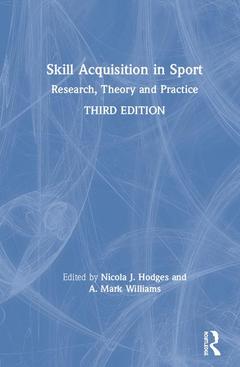Skill Acquisition in Sport (3rd Ed.) Research, Theory and Practice
Coordonnateurs : Hodges Nicola J., Williams A. Mark

Skill Acquisition in Sport gives academics, students, coaches and practitioners the broadest and most scientifically rigorous grounding in the principles and practice of the field. Fully revised, updated and restructured, the third edition integrates theory and practice, and provides more material on practical application than ever before.
Divided into four sections ? providing instruction and feedback, organizing effective practice, training high-level skills, and the theories and mechanisms underpinning skill acquisition ? the book covers a full range of key topics, including:
- the role of errors and rewards in motor learning
- instructions, demonstrations and feedback
- imagery in motor learning
- constraints-based and self-directed learning
- technique change, creativity training and visual gaze training
- practicing under pressure
- the neurophysiology of learning.
Based on the latest research, including chapters on emerging topics, and written by a global cast of world-leading experts, Skill Acquisition in Sport is an essential textbook for any kinesiology or sport science student taking skill acquisition, expertise development or motor learning classes.
Preface: The Science Behind Sport Skill Acquisition: What’s New, What Stood the Test of Time and What Are the Future Challenges?
Section 1: Providing Instruction and Feedback
1. Enhancing Motor Skill Acquisition with Augmented Feedback
2. Changing Automatized Movement Patterns
3. Errors, rewards, and reinforcement in motor skill learning
4. Motor Imagery Practice and Skilled Performance in Sport: From Efficacy to Mechanisms
5. Further advances in implicit motor learning
Section 2: Organizing Effective Practice
6. Contextual Interference: New Findings, Insights, and Implications for Skill Acquisition
7. Self-controlled Learning: Current Findings, Theoretical Perspectives, and Future Directions
8. Learning together: Observation and other mechanisms which mediate shared practice contexts
9. Constraints-Led Learning in Practice: Designing effective learning environments
10. Operationalizing deliberate practice for performance improvement in sport
Section 3: High-level Skill Training
11. Sports training technologies: Achieving and assessing transfer
12. Models of game intelligence and creativity in sport: Implications for skill acquisition
13. Perceptual-Cognitive Expertise and Simulation-Based Training in Sport
14. Mental toughness training
15. Staying cool under pressure: Developing and maintaining emotional expertise in sport
Section 4: Mechanisms and Models of Skill Acquisition
16. Motor Skill learning and its Neurophysiology
17. Appropriate Failure to Create Effective Learning: Optimizing Challenge
18. Ecological Dynamics and Transfer from practice to performance in sport
19. The Development of skill and Interest in Sport
Nicola J. Hodges is a Professor at the University of British Columbia (UBC), Vancouver, Canada in the School of Kinesiology. Originally from the UK, she developed a passion for sport (namely soccer) and experimental psychology and has continued to live out these passions through the study of motor behaviour in Canada over the last 25 years. It is at UBC that Dr Hodges runs the Motor Skills Laboratory (http://msl.kin.educ.ubc.ca), where she studies the mechanisms of motor skill learning. Her particular research focus is on processes involved in watching and learning from others (action-observation) and how practice should be best structured to bring about long-term enhancement of motor skills. Her research has been funded by the three tri-council agencies in Canada, she has been involved in sport-consulting and she has published over 100 peer-reviewed articles and chapters.
A. Mark Williams is Chair of Health, Kinesiology, and Recreation at the University of Utah, USA. His research interests focus on the neural and psychological mechanisms underpinning the acquisition and development of expertise. He has published more than 200 journal articles in peer-reviewed outlets, written more than 80 book chapters and co-authored/edited 15 books. His research work has been supported by various funding agencies in the UK, USA and Australia. He is a Fellow of the European College of Sports Science, the British Association of Sport and Exercise Science, the National Academy of Kinesiology and the British Psychological Society. He is Editor-in-Chief of several academic journals.
Date de parution : 11-2019
15.6x23.4 cm
Date de parution : 11-2019
15.6x23.4 cm
Thème de Skill Acquisition in Sport :
Mots-clés :
Transcranial Direct Current Stimulation; A; Mark Williams; Motor Imagery Practice; biofeedback; M1 Excitability; constraints-based learning; SRT Task; creativity training; Implicit Motor Learning; deliberate practice; Vice Versa; demonstrations; Contextual Interference; effective practice; Interleaved Practice; errors in motor learning; Perceptual Cognitive Skills; expert performance; Augmented Feedback; feedback; Perceptual Cognitive Training; fields of affordances; high-level skill; Corticospinal Excitability; imagery in motor learning; Mental Toughness; instruction; Qe Training; learning from teaching; Motor Memories; mental toughness training; Motor Imagery; motor control; Reward Prediction Errors; motor learning; Self-controlled Learning; neurophysiology of learning; Motor Imagery Ability; Nicola Hodges; Task Intrinsic Feedback; practical skill acquisition; Perceptual Cognitive Expertise; practice under pressure; Mi Practice; reward; Cl Group; self-directed learning; Challenge Point Framework; skill acquisition; skill training; sport skill; structured practice; technique change; training technologies; unstructured practice; variability of practice; visual gaze training



